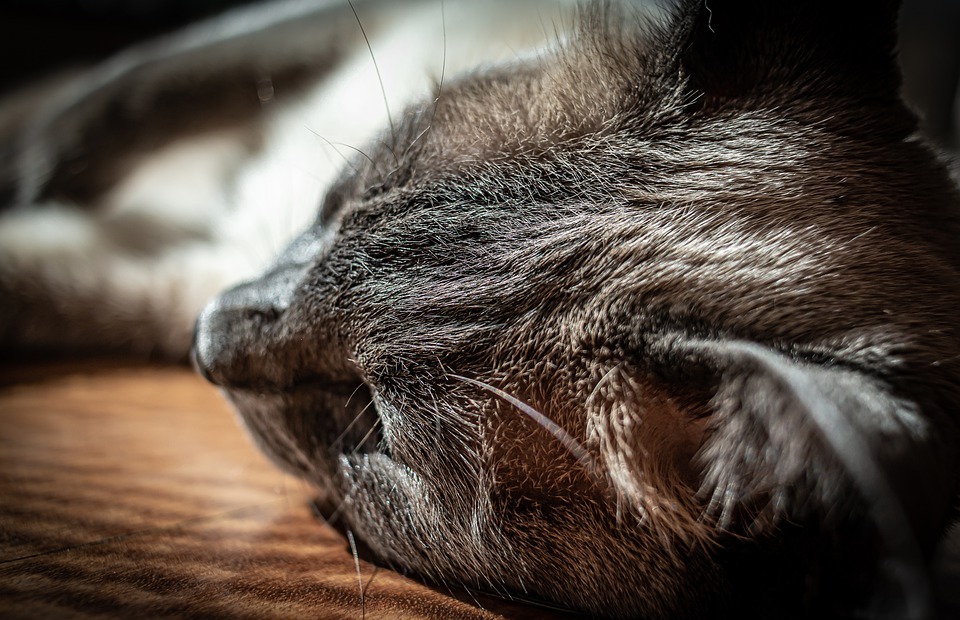This article explores the complex question of whether cats can safely consume raw eggs. We'll delve into the potential benefits and risks associated with this dietary choice, considering the nutritional content of raw eggs, the possibility of salmonella poisoning, and the potential for biotin deficiency. We will also examine the impact of raw eggs on cats with specific dietary needs, such as kittens, pregnant or nursing cats, and those with pre-existing health conditions. Finally, we'll provide practical guidance on how to introduce raw eggs into a cat's diet safely and answer common questions about feeding raw eggs to feline companions.
Part 1: Nutritional Benefits of Raw Eggs

1.1. Protein Powerhouse
Raw eggs are a rich source of high-quality protein, boasting a protein content of around 6 grams per large egg. This protein is essential for muscle growth, repair, and maintenance, especially crucial for kittens and active cats. The protein in eggs is also highly bioavailable, meaning it's easily absorbed and utilised by the cat's body.
1.2. Essential Vitamins and Minerals
Raw eggs are a treasure trove of essential vitamins and minerals vital for feline health.
- Vitamin A: Supports vision, skin health, and immune function, especially important for kittens whose immune systems are still developing.
- Vitamin B12: Crucial for red blood cell production and nerve function, helping maintain a healthy nervous system.
- Riboflavin (Vitamin B2): Plays a role in energy metabolism, contributing to the cat's overall energy levels and activity.
- Biotin (Vitamin B7): Important for skin, hair, and nail health, promoting a glossy coat and strong claws.
- Choline: Essential for brain development and memory function, crucial for kittens' cognitive development and for supporting healthy cognitive function in older cats.
- Selenium: An antioxidant that protects cells from damage, bolstering the cat's immune system and promoting overall health.
1.3. Healthy Fats and Calories
Raw eggs contain healthy fats, including omega-3 fatty acids, which are beneficial for heart health and brain function. However, they are also relatively high in calories, with approximately 78 calories per large egg. This means that it's essential to consider your cat's weight and activity level when incorporating them into their diet, especially for overweight or less active cats.
Part 2: The Risks of Feeding Raw Eggs

2.1. Salmonella Contamination: A Major Concern
Raw eggs are a potential source of Salmonella bacteria, a common cause of food poisoning in cats. Salmonella contamination can occur during egg production, processing, or storage. Symptoms of Salmonella poisoning in cats include:
- Vomiting: Frequent or forceful vomiting can lead to dehydration.
- Diarrhoea: Watery diarrhoea can also lead to dehydration, and may be accompanied by blood.
- Fever: A raised temperature can indicate a severe infection.
- Lethargy: A lack of energy and listlessness are common symptoms of illness.
- Loss of appetite: Cats may refuse food due to discomfort or nausea.
Salmonella poisoning can be particularly dangerous for kittens, older cats, and those with weakened immune systems.
2.2. Biotin Deficiency: The Avidin Factor
Raw egg whites contain avidin, a protein that binds to biotin (vitamin B7), making it unavailable for absorption. This can lead to biotin deficiency, which can cause:
- Skin problems: Dry, flaky skin, and even hair loss.
- Hair loss: Hair loss can be patchy or widespread, affecting the coat's overall health and appearance.
- Nail abnormalities: Brittle, thin, or cracked nails.
- Neurological issues: In severe cases, biotin deficiency can affect the nervous system, leading to seizures or other neurological complications.
2.3. Choking Hazard: A Risk for Cats
Raw eggs, especially large ones, can be difficult for cats to swallow, potentially leading to choking or digestive problems. It's important to break eggs carefully and ensure they are small enough for your cat to manage safely.
2.4. Potential for Food Allergies
While rare, cats can develop allergies to egg proteins. Symptoms of egg allergies include:
- Skin problems: Itching, redness, and rashes.
- Digestive problems: Vomiting, diarrhoea, and gas.
- Respiratory problems: Wheezing, coughing, and difficulty breathing.
Part 3: The Benefits of Cooking Eggs for Feline Consumption

3.1. Eliminating Salmonella Risk: A Safety Measure
Cooking eggs thoroughly destroys any harmful bacteria, including Salmonella. This makes cooked eggs a safer option for cats, especially kittens, older cats, and those with compromised immune systems.
3.2. Enhancing Biotin Absorption: A Nutritional Boost
Heat denatures avidin, making biotin more readily available for absorption. Cooked eggs can therefore provide a good source of biotin for cats without the risk of deficiency.
3.3. Improving Palatability: A More Appealing Treat
Many cats find cooked eggs more palatable than raw eggs, making them a more appealing treat or meal supplement.
3.4. Ease of Digestion: Minimising Digestive Upset
Cooked eggs are generally easier for cats to digest than raw eggs, reducing the risk of digestive upset and ensuring better nutrient absorption.
Part 4: Feeding Raw Eggs to Cats with Specific Dietary Needs
4.1. Kittens: A Strict No-No
Kittens should never be given raw eggs. Their immune systems are still developing, making them highly susceptible to salmonella poisoning. Additionally, kittens require specific nutrients for growth and development, which are readily available in kitten-specific commercial foods.
4.2. Pregnant or Nursing Cats: Avoid Raw Eggs
Pregnant or nursing cats should also avoid raw eggs. The risks of salmonella poisoning are higher during these periods, and the potential for biotin deficiency can affect the health of the mother and her kittens.
4.3. Cats with Pre-existing Health Conditions: Seek Veterinary Guidance
Cats with pre-existing health conditions, such as kidney disease or allergies, may be at higher risk from the consumption of raw eggs. It's essential to discuss with your veterinarian whether raw eggs are safe and appropriate for your cat's individual needs.
Part 5: Alternatives to Raw Eggs for Feline Diets
5.1. Cooked Eggs: A Safe and Nutritious Choice
As discussed above, cooked eggs offer a safe and nutritious alternative to raw eggs for cats. You can offer them scrambled, boiled, or poached, ensuring they are cooked through to eliminate the risk of salmonella contamination.
5.2. Commercial Cat Food: Convenience and Complete Nutrition
High-quality commercial cat food is formulated to meet your cat's nutritional needs and is a convenient and reliable option. It provides a balanced diet and eliminates the risks associated with raw eggs.
5.3. Other Protein Sources: Diversifying the Diet
Cats can also get protein from other sources, such as:
- Chicken: A lean protein source, rich in vitamins and minerals.
- Fish: Provides omega-3 fatty acids, beneficial for heart and brain health.
- Turkey: Another lean protein option with a lower fat content than chicken.
- Beef: A good source of protein and iron, but should be given in moderation due to its higher fat content.
- Lamb: A rich protein source, but can be more expensive than other options.
Part 6: How to Feed Raw Eggs to Cats Safely
6.1. Prioritise Safety: Minimising Risks
If you decide to feed your cat raw eggs, it's crucial to prioritize safety:
- Source: Obtain eggs from a reputable source, preferably organic and free-range, to reduce the risk of contamination.
- Handling: Wash your hands thoroughly with soap and water after handling raw eggs to prevent the spread of bacteria.
- Preparation: Break the eggs open carefully and check for any signs of spoilage before feeding them to your cat. Discard any eggs with cracked shells or unpleasant odours.
6.2. Gradual Introduction: Avoiding Digestive Upset
Introduce raw eggs gradually to your cat's diet, starting with small amounts. Monitor their reaction and adjust the amount accordingly. This helps minimise the risk of digestive upset.
6.3. Monitoring for Adverse Reactions: Identifying Potential Issues
Pay close attention to your cat's behaviour and health after feeding them raw eggs. Look for signs of illness, such as vomiting, diarrhoea, lethargy, or changes in appetite. If you notice any adverse reactions, discontinue feeding raw eggs and consult your veterinarian immediately.
Part 7: FAQs about Feeding Cats Raw Eggs
7.1. Can Kittens Eat Raw Eggs?
No, kittens should not eat raw eggs. Their immune systems are still developing, making them highly susceptible to foodborne illnesses, including salmonella poisoning.
7.2. Can Pregnant or Nursing Cats Eat Raw Eggs?
It's generally not recommended for pregnant or nursing cats to eat raw eggs. The potential risks outweigh any potential benefits, and it's best to stick to a balanced and safe diet during this sensitive time.
7.3. How Often Can Cats Eat Raw Eggs?
If your veterinarian approves of raw eggs for your cat, they will advise you on the appropriate frequency. This will vary depending on your cat's individual needs, weight, activity level, and overall health.
7.4. Can Cats Eat Raw Eggshells?
No, cats should not eat raw eggshells. They are difficult to digest and can cause digestive problems. Eggshells are also a source of calcium, which is already provided in a balanced diet.
7.5. What if My Cat Eats a Raw Egg?
If your cat accidentally eats a raw egg, monitor their behaviour and health for any signs of illness. If you notice any adverse reactions, contact your veterinarian immediately.
7.6. Can I Give My Cat Raw Eggs Every Day?
It's generally not recommended to give your cat raw eggs every day. A balanced diet with a variety of protein sources is essential for optimal health.
7.7. What Are the Best Types of Raw Eggs for Cats?
There is no specific type of raw egg that is considered better than others for cats. However, choosing organic and free-range eggs can reduce the risk of contamination.
7.8. Can I Feed My Cat Raw Egg Yolks Only?
While the yolk is the more nutritious part of the egg, it's still not recommended to feed raw yolks exclusively. This can lead to biotin deficiency due to the presence of avidin. Additionally, feeding only the yolk can lead to an unbalanced diet.
7.9. Is it Safe to Feed My Cat Raw Eggs if I Cook the Yolks and Feed Them Raw?
No, this is not recommended. The risk of salmonella contamination remains even if you cook the yolks. It's best to cook the entire egg thoroughly to ensure safety.
7.10. What are the Signs of Salmonella Poisoning in Cats?
Signs of salmonella poisoning in cats include vomiting, diarrhoea, fever, lethargy, and loss of appetite. If you suspect your cat has salmonella poisoning, contact your veterinarian immediately.
7.11. What are the Signs of Biotin Deficiency in Cats?
Signs of biotin deficiency in cats include skin problems, hair loss, nail abnormalities, and neurological issues. If you notice any of these symptoms, consult your veterinarian to determine the cause and appropriate treatment.
Part 8: Conclusion: Prioritise Safety and Consult Your Veterinarian
While raw eggs may offer some nutritional benefits for cats, the risks of salmonella poisoning, biotin deficiency, and choking hazards outweigh these potential benefits. It's generally safer and more practical to feed your cat cooked eggs or high-quality commercial cat food to ensure a balanced and safe diet.
Ultimately, the decision of whether or not to feed raw eggs to your cat should be made in consultation with your veterinarian. They can assess your cat's individual needs, health status, and any potential risks associated with raw egg consumption.
Everyone is watching
-

Are Cat Ribs Flexible? Understanding Their Anatomy
CATS & KITTENSThis article delves into the fascinating world of feline anatomy, exploring the flexibility of cat ribs and ho...
-

Can Cats Eat Bananas? (Everything You Need to Know)
CATS & KITTENSThis article dives into the intriguing question of whether cats can safely enjoy the sweet, yellow fruit, bana...
-

Cat Lifespan: How Long Do Cats Live?
CATS & KITTENSThis comprehensive guide explores the factors influencing the lifespan of our feline companions, providing ins...
-

Can Cats Get COVID-19? What You Need to Know
CATS & KITTENSThis article will delve into the fascinating world of feline COVID-19 susceptibility. We'll explore whether ca...
-

Can Cats Eat Eggs? A Complete Guide to Egg Safety for Your Feline Friend
CATS & KITTENSWhen it comes to treating our furry companions, we all want to ensure we're doing what's best for them. Eggs...
